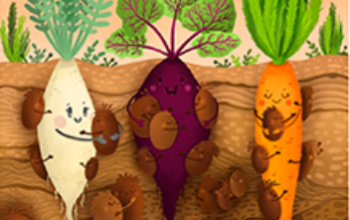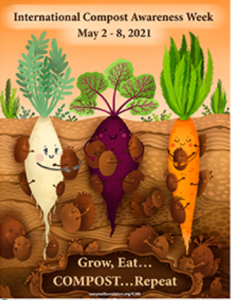Compost Awareness Week – 2nd to 8th May, 2021
April 30, 2021

 International Compost Awareness Week is held every year in early May. It’s aimed at raising awareness of the benefits of composting and encourages people to compost wherever they are in the world. This year the theme is ‘Grow, Eat…COMPOST…Repeat’.
International Compost Awareness Week is held every year in early May. It’s aimed at raising awareness of the benefits of composting and encourages people to compost wherever they are in the world. This year the theme is ‘Grow, Eat…COMPOST…Repeat’.
The theme is based on the circular movement of organic growing, flowing from farm to table to farm again. The circular process turns recycled organic materials into compost which creates healthy soils, leading to improved nutrients in the food and the peelings going back into the compost to start the process again.
From on-farm composting, large-scale commercial composting, right down to composting in our own gardens and allotments, this amazing resource has a valuable role to play in growing healthier food, supporting healthier soils, and helping us all to create a more sustainable future.
If you haven’t yet tried making your own compost, then this year we would really encourage you to give it a go.
Compost Awareness Week Challenge
To celebrate International Compost Awareness Week, 2021, we’ve devised a fun interactive quiz to check your knowledge on composting at home:
Composting at home or at the allotment
During the last year, many people spent more time than usual enjoying their gardens and this encouraged a lot of residents to start making their own compost. As we were unable to deliver face to face talks or attend events, we have put together a range of videos to help guide you on all things composting.
Spring is an excellent time to start composting. Alternatively, it’s also a good time to sort and use your compost in readiness for the growing season.
Composting is an inexpensive, natural process that transforms your fruit and vegetable peelings, along with paper and cardboard from the home and mix of garden waste, to produce a nutrient rich product, which not only feeds your soil but also improves the structure of it. It is quite a straightforward process and the important part is putting in a good mix of materials to balance what we call the items high in nitrogen (the fresh, moist, greens) and the items high in carbon (the drier, fibrous, browns).
It’s also worth knowing that you don’t need a large garden to compost, you can still compost with only a patio and very little garden material. You can focus on putting in your fruit and vegetable peelings, tea leaves and coffee grounds and balance these materials with a mix of paper and cardboard, such as toilet roll and kitchen roll tubes; cardboard egg boxes and scrunched up paper from the home.
So if you are now considering it, about to start or still relatively new to the process, you can find out more on our home composting page or view our range of videos below. Our first video, ‘An introduction to composting’, talks you through the process, including the benefits both to you and the environment; what can go in; what to leave out and how it works. Watch the video below:
If you started composting during the year and encountered some issues, then the next video on troubleshooting might just be the answer. It talks you through what to do if your compost is too wet or too dry; how to speed up the composting process; how to manage tricky weeds and wildlife in your compost. Watch the video below:
https://youtu.be/OcZ3Jkq8KHk
Once the compost is made then the next video covers how to get the compost out of the bin. There’s a knack to this, see below:
https://youtu.be/jDc5k-bM1rE
And finally, ‘How to use your compost’, and there are plenty of suggestions to help you make the most of your compost to benefit your garden, patio containers or allotment.
Remember the theme for this year ‘Grow, Eat…COMPOST… Repeat’. Adding compost will be putting the goodness back into the soil to complete the cycle, especially relevant for any fruit and vegetable growers amongst you.
If you find you regularly have food waste, including cooked foods or plate scrapings then check out our guidance on reducing food waste. We also have information on a range of food waste digesters which allow you to make the most of any wider food waste, rather than just your peelings. Take a look at our page on food waste digesters for further information.
You can find further information on composting here: https://www.lesswaste.org.uk/compost/
And remember we have volunteers who can offer further guidance to support you in your composting endeavours. You can email us at: wasteprevention@leics.gov.uk or telephone us on: 0116 305 7005










